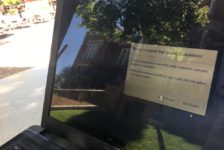
Tamara Stevenson, a communication professor at Westminster College, speaks outside Converse Hall at a Martin Luther King Jr. Day rally on Jan. 16. Stevenson said it’s important to recognize and celebrate black history not only during the month of February but also all year round. Photo by Jane Jerman
As Westminster College’s Black History Month comes to a close, organizers of the college’s monthly heritage series said they agree that recognition of the history and ongoing struggles of black students should not be limited to a single month.
The Forum spoke separately with Black History Month event organizers Daniel Cairo, Tamara Stevenson and Marco Barker to learn more about the month’s significance on campus and beyond. Their responses have been edited for clarity and conciseness.
The Forum: Why is it important to celebrate Black History Month?
Cairo: Cultural awareness months matter because, one, they contribute to the social fabric of the campus. It allows us to pay attention to the contributions and issues that are happening to our different communities on campus, but we should not only be talking about these issues in February. But having the awareness month really allows us to take that moment to be more thoughtful and intentional. The other piece is that there are members of our community that don’t see themselves as part of the cultural fabric of our campus, so this our our very intentional way of making sure we are talking about the issues that are important to various populations.
Barker: Black History Month is an important time to remember and celebrate how the history of African Americans, blacks, Africans, and the African Diaspora is part of U.S. history. The month observance, like other cultural observances, reminds us that our notions of American history— developments and contributions—must be observed, studied and viewed through multiple lenses. This month of celebration and reflection both reaffirms how blacks in history through today continue to make significant contributions, but most importantly how there still remains much to understand about America’s history.
Stevenson: I have always heard the phrase over the years, ‘black history is American history.’ I would turn that phrase to say, ‘American history is black history.’ It’s a combination; it’s all intertwined. It still matters to remember accomplishments of those who have come before but also to remember what is happening now. We need to remind ourselves of where we have been so we can know where we are going. It’s important to celebrate black history not only in February but all year round.
The Forum: How do you encourage student participation in the Black History Month events?
Barker: I think how we engage students and build participation in diversity-related events is an area that I would like to see more growth [in]. As chief diversity officer, I am working closely with college leadership to create a culture where opportunities for learning, like Black History Month, are shared throughout the campus and are highly encouraged from all aspects of Westminster. It is not only up to me but it is all of our responsibility to encourage our colleagues, students and peers to take moments to learn more about other cultures—it speaks to our core value of social responsibility.
The Forum: What do you think Westminster has done well in celebrating Black History Month?
Cairo: The campus is being very thoughtful on how we have conversations of inclusion [and] how do we develop actions so that we can be an inclusive, welcoming campus. We also have the lecture series where we have close to 100 people showing up—including members from the senior team. That matters. It tells us that the administration and members of our community care about engaging in these conversation and dialogues. That is what Black History Month provides. It gives us an opportunity to know where we are at, figure out where we want to go and tell us how we’re going to get there.
Barker: Whether you were looking for African performance art or for an opportunity to be an ally, the range of programming we had at Westminster tapped into the liberal arts culture of our institution and provided educational, cultural and critical perspectives. I am extremely proud of the work that is happening on our campus.
The Forum: What does Westminster do to create participation on campus?
Cairo: It is really a balance of knowing what is happening with that particular community [and] understanding the things that need to be talked about. We usually have advisory committees. We always want to have a co-curricular aspect to the lectures. It’s an interesting negotiation between celebration and awareness.
The Forum: What else should people know about Black History Month?
Barker: I feel that it is important to remember that Black History Month is not reserved to blacks or African Americans. It is an opportunity for all of us to better understand how black history is tightly interwoven in the history of America—the challenges and achievements. Our ability to be the best leaders, thinkers and decision makers [relies] on having a full understanding of the world in which we live, and black history and the African Diaspora is a part of that world. I invite everyone to take future opportunities and heritage months to learn about different cultures and the experiences of others.
Stevenson: Hopefully this empowers people to examine their own backgrounds more. Our world is becoming increasingly diverse and that trend is not going backwards. We are becoming a minority majority country. Things are changing; things are shifting. We need to be open and aware of those changes. It doesn’t have to be seen as a deficit or destruction. Talking about black history is one way to begin that conversation.









